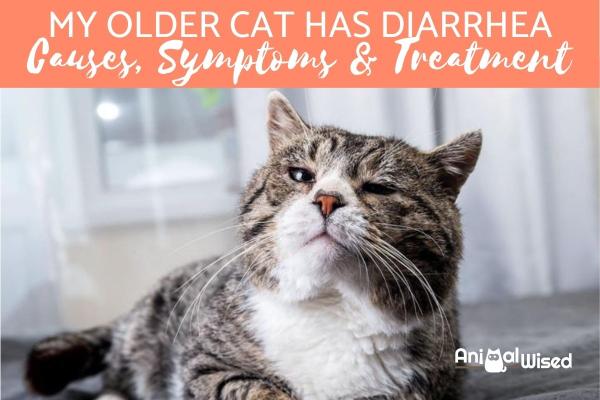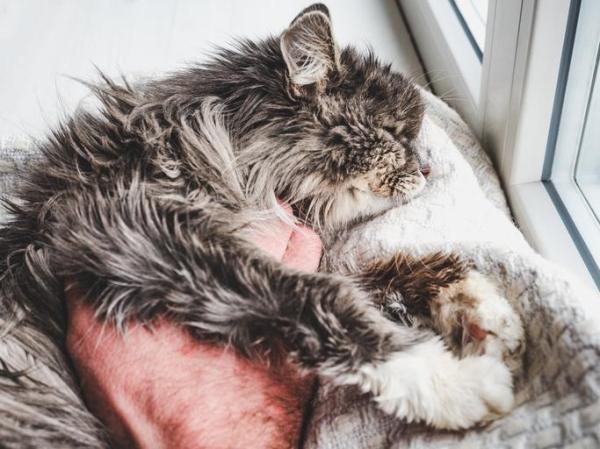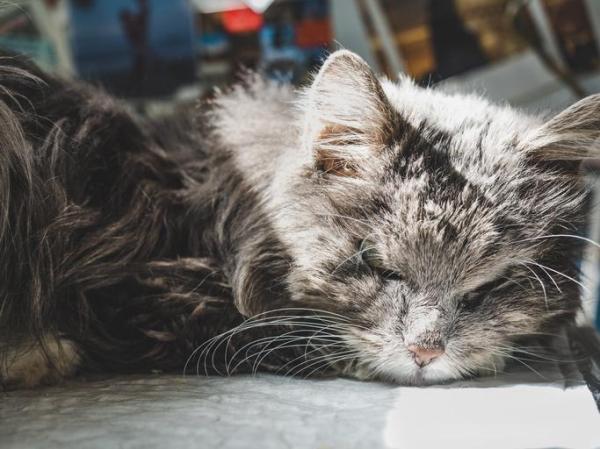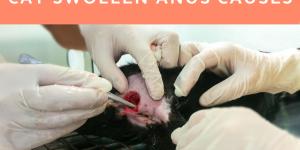My Older Cat Has Diarrhea



See files for Cats
Diarrhea is a clinical sign which indicates a cat has gastrointestinal problems. However, the causes of GI issues are extremely varied. Some are relatively benign and will clear up on their own in a short time. Others can be more serious and require veterinary medical intervention. Although diarrhea in cats is common, it should never be ignored. This is especially the case with older cats. Senior cats often have weaker immune systems due to the effects of age, so even milder disease can cause serious difficulty.
My older cat has diarrhea - At AnimalWised, we look at the causes of diarrhea in older cats. Before we do, we always encourage taking your cat to the veterinarian if you see symptoms of disease, but this is especially so in senior cats.
Types of diarrhea in older cats
Diarrhea in cats occurs when there is excess water in the stool. This can lead to more frequent bowel movements, greater hydration in the stool and a larger volume of excretion. In diseases of the small intestine, diarrhea occurs when the intestinal content exceeds the absorption capacity of the large intestine or if there is a chronic secretion of water. With the large intestine, this occurs when there is not section left where water can be absorbed.
Small intestine diarrhea is characterized by:
- Large volume stools
- Normal or increased frequency
- Thin consistency
- Digested blood may appear
- Accompanied by weight loss, vomiting or systemic symptoms
Large intestine diarrhea is characterized by:
- Very increased frequency
- Stool of normal, increased or decreased volume
- Urgency to defecate
- Presence of mucus
- Soft consistency
- Fresh blood may appear
Diarrhea in older cats can also be categorized by its duration
- Acute: lasting less than two weeks
- Chronic: persists over 2-3 weeks
Causes of diarrhea in older cats
As explained above, diarrhea in cats can be due to various causes. However, a cat's age will affect the underlying reason. Although it can occur in cats of any age, kittens are more prone to infectious diarrhea. In cats of up to 6 years of age, diarrhea due to inflammatory bowel disease or an adverse reaction to a particular food are more common.
Older cats are more prone to intestinal tumors than younger cats. Infections, IBD and other diarrhea causing diseases can still affect older cats, especially if their immune system has been weakened. In general, the possible causes of diarrhea in older cats are as follows:
- Hyperthyroidism
- Intestinal lymphosarcoma
- Intestinal adenocarcinoma
- Intestinal mast cell tumor
- Exocrine pancreatic insufficiency
- Pancreatitis
- Hepatobiliary disease
- Renal disease
- Colorectal polyp
- Foreign body
- Abrasive colitis (ingestion of toxic plants or inappropriate foods)
- Intussusception (blockage due to intestine looping or bending)
- Perianal hernia or tumor
- Inflammatory bowel disease (IBD)
- Protein-losing enteropathy
- Drugs: NSAIDs, antibiotics
- Adverse reaction to food
- Bacteria: Salmonella, Campylobacter, Clostridium perfringes
- Viruses: Feline coronavirus, leukemia and feline immunodeficiency
- Parasites: Toxoplasma gondii
- Fungi: Histoplasma
If you adopt an adult cat, it is possible you are unsure of your cat's age. The shelter or previous owner should provide some guidance and a veterinary assessment should be carried out. However, you can also look out for signs of old age in cats to give you an idea of their life stage.

Symptoms of diarrhea in older cats
The symptoms that the cat manifests will depend on the underlying disease. The type of diarrhea (small or large intestine) will also affect symptoms. Diarrhea is a symptom itself and not a disease, but there are often concurrent symptoms including:
- Weight loss
- Vomiting
- Appetite loss
- Anorexia or polyphagia (hyperthyroidism)
- Flatulence
- Dehydration
- Weakness
- Lethargy
- Arched back (indicates abdominal pain)
- Pale mucous membranes (anemia due to gastrointestinal blood loss)
- Jaundice (liver or bile duct disease)
- Polydipsia (drinking more water) to compensate for dehydration
- Polyuria (increased urination) with kidney disease.
Older cats with small intestine problems will produce large quantities of water diarrhea which may include digested blood. This is because it comes from further up the digestive tract. If the damage occurs due to the large intestine, the stools will be smaller, but have greater frequency and the cat will have greater difficulty in making a bowel movement.
In most cats, of whatever age, a combination of small and large intestine diarrhea occurs. This makes it difficult to determine the cause solely from looking at stool samples. Where the old cat defecates will also complicate diagnosis since some might do it outside where we can't see or there are more than one cat defecating in the same litter box. We can check the cat's rear as liquid stool might be present around the anal area.
Diagnosis of diarrhea in older cats
As we have mentioned, diarrhea in older cats can be caused by different conditions and diseases. To determine the cause, the veterinarian will need to carry out a differential diagnosis since many diseases may provide similar symptoms. This will require examination of the older cat, assessing their medical history and carrying out some combination of the following tests:
- Blood analysis and blood chemistry.
- Total thyroxine (Total T4) test and palpation of the neck area to rule out hyperthyroidism.
- Determination of feline pancreatic lipase to rule out pancreatitis.
- Leukemia and feline immunodeficiency tests.
- Check folate levels to determine absorption failure in the proximal intestine and vitamin B12 to assess absorption in the distal intestine (ileum). They are used to determine the site of damage. In addition, low levels of vitamin B12 are seen in chronic pancreatic or liver disease.
- Serial stool analysis by flotation and sedimentation on three different days to detect parasites.
- Rectal cytology by introducing a swab into the rectum moistened with physiological saline, performing the cytology on a slide and viewing under the microscope after staining with Diff Quick to assess the presence of bacterial infection ( lostridium, Salmonella, Campylobacter), having to comply with culture of feces and PCR of Clostridium perfringens, Salmonella and coronavirus.
- Bowel biopsy to differentiate inflammatory bowel disease or neoplasia.
Blood tests and biochemistry are performed to assess:
- Anemia due to inflammatory disease or gastrointestinal loss of blood, together with hypoproteinemia, thrombocytosis and increased urea.
- Leukocytosis if there is inflammation.
- Eosinophilia if there are parasites or food sensitivity.
- Dehydration if there is an increase in hematocrit and total serum proteins.
- Elevated liver enzymes may be indicative of liver failure or pancreatitis.
- Increased creatinine and urea in kidney disease.
It must be taken into account that older cats can present several diseases that cause diarrhea at the same time. The approach to the case will be different according to each cat and their diagnosis. In mild cases, a veterinarian may simply request a soft diet for cats with diarrhea until the problem is resolved.
Treatment of diarrhea in older cats
If a cat has a treatable disease it needs to be treated by a veterinary medical professional. Even in cases where no specific treatment can be provided, management of symptoms is vital for quality of life. If an older cat has diarrhea, they may require one of the following treatments:
- Immunosuppressants for inflammatory bowel disease.
- Chemotherapy if intestinal tumors are diagnosed.
- Treatment of kidney disease.
- Treatment of liver disease.
- Hyperthyroidism treatment.
- Vitamin B12 supplement when they have a deficiency.
- Fluid therapy to replace fluids and electrolytes if there is dehydration due to diarrhea and vomiting in some cases.
- If they have gastrointestinal histoplasmosis antifungal treatment with itraconazole will be prescribed.
- If they are infected with toxoplasmosis, clindamycin, trimethoprim/sulfonamide, or azithromycin are used.
- Prebiotics and probiotics to modulate the imbalances of the intestinal flora may be administered for at least 4 weeks. Sometimes the treatment must be prolonged to achieve advantages in the cat's immunity.
- Pancreatic enzymes in case of exocrine pancreatic insufficiency.
- Analgesics such as buprenorphine in case of pancreatitis.
- Elimination, hydrolyzed or hypoallergenic diet if an adverse reaction to food is suspected.
Since there can be several causes of diarrhea in older cats, it is very important to go to the vet. Do so if your cat has diarrhea and an irritated anus, persistent loose stools and other symptoms such as those described above.

Prognosis for older cats with diarrhea
Older cats are more prone to the development of disease in general, many of which can lead to diarrhea. In some cases there are more acute and serious clinical symptoms. Unfortunately, cats are too good at hiding their ailments from their guardians. Even if they are in pain, they may not show outward signs until the pain is unbearable.
For this reason, it is essential we provide comprehensive care for older cats and observe them continually for any signs of illness. We also need to decrease the time between checkups as more regular checkups can help us to catch a problem early and improve the prognosis.
Once cats reach 7-8 years of age, they are at a much greater risk of serious and debilitating disease. If they are geriatric cats (14+ years), they we need to be extra careful. Ensure checkups, deworming and other preventive treatments are provided according to the veterinarian's guidelines.

This article is purely informative. AnimalWised does not have the authority to prescribe any veterinary treatment or create a diagnosis. We invite you to take your pet to the veterinarian if they are suffering from any condition or pain.
If you want to read similar articles to My Older Cat Has Diarrhea, we recommend you visit our Other health problems category.
- Harvey, A., & Tasker, S. (Eds). (2014). Feline Medicine Manual. Ed. Sastre Molina, SL L ́Hospitalet de Llobregat, Barcelona, Spain.
- Avepa. (2013). Diagnosis and management of diseases of the feline digestive system. Available at: https://www.avepa.org/pdf/proceedings/FELINO_PROCEEDING2013.pdf







